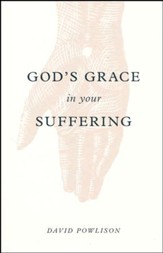Quotes about Suffering-Benefits
Affliction and suffering have been appointed by God as instruments He uses to make us more holy, to make us more like Jesus. They remind us that we are weak and we must rely not on ourselves, but on Jesus. They remind us that this world is not our home but that we are only passing through toward our real home in heaven with our Father, our Savior, Jesus Christ, and our Comforter, the Holy Spirit.
We should neither court suffering nor complain about it. Instead, we should see it as one of the means God chooses to employ in order to make us increasingly useful to the Master. It is from this perspective that James urges his readers to “consider it pure joy…whenever you face trials of many kinds” (James 1:2).
That which should distinguish the suffering of believers from unbelievers is the confidence that our suffering is under the control of an all-powerful and all-loving God; our suffering has meaning and purpose in God’s eternal plan, and He brings or allows to come into our lives only that which is for His glory and our good.
The Practice of Godliness, NavPress, 1996, p. 32. Used by permission of NavPress – www.navpress.com, All rights reserved. Get this book!
Every adversity that comes across our path, whether large or small, is intended to help us grow in some way. If it were not beneficial, God would not allow it or send it, “For he does not willingly bring affliction or grief to the children of men” (Lamentations 3:33). God does not delight in our sufferings. He brings only that which is necessary, but He does not shrink from that which will help us grow.
Trusting God, 1988, p. 177. Used by permission of NavPress – www.navpress.com, All rights reserved. Get this book!
Look, as our greatest good comes through the sufferings of Christ, so God’s greatest glory that He hath from His saints comes through their sufferings.
A Puritan Golden Treasury, compiled by I.D.E. Thomas, by permission of Banner of Truth, Carlisle, PA. 2000, p. 288.
You must submit to supreme suffering in order to discover the completion of joy.
The Gospel gets really more advantage by the holy, humble sufferings of one saint, simply for the Word of righteousness, than by ten thousand arguments used against heretics and false worship.
A Puritan Golden Treasury, compiled by I.D.E. Thomas, by permission of Banner of Truth, Carlisle, PA. 2000, p. 288.
Though my natural instinct is to wish for a life free from pain, trouble, and adversity, I am learning to welcome anything that makes me conscious of my need for Him. If prayer is birthed out of desperation, then anything that makes me desperate for God is a blessing… Puritan pastor William Gurnall makes this point in his writings, “The hungry man needs no help to teach him how to beg.”
He has chosen not to heal me, but to hold me. The more intense the pain, the closer His embrace. The greatest good suffering can do for me is to increase my capacity for God. Real satisfaction comes not in understanding God’s motives, but in understanding His character, in trusting in His promises, and in leaning on Him and resting in Him as the Sovereign who knows what He is doing and does all things well.
How can all things be worked together by God for good? The answer is at hand. It is because God’s ultimate purpose is to make us like Christ. His goal is the complete restoration of the image of God in His child! So great a work demands all the resources which God finds throughout the universe, and He ransacks the possibilities of joys and sorrows in order to reproduce in us the character of Jesus.
Benefits of suffering:
1. Divine retribution.
2. Divine discipline (Pr. 3:11; Heb. 12:5-11).
3. Testing, proving (Gen. 22:1; Dt. 8:2, 16, Jas. 1:3; 1 Pet. 1:7).
4. Vicarious suffering (Num. 11:1-15; Hos. 1-3, Isa. 52:13-53:12).
5. Educational (Heb. 5:8).
6. Revelation (Jn. 9:2-3).
7. Repentance, seek God (Hos. 5:15; Isa. 19:22; 2 Cor. 7:9-10).
8. Self-denial (Lk. 22:42; 2 Cor. 1:8-9; 2 Cor. 12:7; Rom. 5:3-4; Rom. 8:29; 2 Cor. 4:10-11; Heb. 12:10; Jas. 1:2).
9. Solidarity – In suffering we band and bond together (Rom. 12:15; 1 Cor. 12:26).
10. Ministry of comfort (2 Cor. 1:3-4; Heb. 4:15).
11. Glorification (Rom. 8:17; 2 Cor. 4:17).
Excerpted from: Suffering, Study Outlines, 1999, www.christinyou.net. Used by Permission.
Whatsoever is upon you is from the Lord, and whatsoever is from the Lord, to you it is in mercy; and whatsoever comes in mercy ought not to be grievous to you. What loss is it when the losing of earthly things is the gaining of spiritual things? All shall be for your good, if you make your use of all.
A Puritan Golden Treasury, compiled by I.D.E. Thomas, by permission of Banner of Truth, Carlisle, PA. 2000, p. 13.
Suffering as a Christian is a sign that God is powerfully at work in our lives. Longing for our final redemption, suffering for doing right, and being persecuted for our faith are all evidence that God has begun the good work of making us like Christ. Our suffering consequently becomes a great encouragement to our faith, since those who share in Christ’s sufferings know that they will also share in his resurrection (Matt. 5:11-12; Rom. 8:17; Phil. 3:10).
Why is There So Much Pain and Evil in the World? by Scott Hafemann taken from The God of Promise and the Life of Faith by Scott Hafemann, copyright 2001, Crossway Books, a division of Good News Publishers, Wheaton Illinois 60187, www.crosswaybooks.org, p.
So God prepares His people by giving them a foretaste of the glory to come, in order that the suffering of this present age might be put into its proper perspective. And He gives them suffering so that the glory to come might be put into its proper perspective as well.
Suffering strengthens resolve and increases the value of Christ for those who, in response to the presence of the Spirit in their lives, genuinely trust God’s love and power. Rather than destroying faith-induced hope, suffering spurs it on. It is the fire that fortifies faith, stripping away the illusion of the world’s glamour and gold and unmasking our powerlessness to solve our own problems, or provide for our own security (Luke 12:16-21). Suffering therefore teaches us to esteem God’s promises as our only hope.
As the wicked are hurt by the best things, so the godly are bettered by the worst.
A Puritan Golden Treasury, compiled by I.D.E. Thomas, by permission of Banner of Truth, Carlisle, PA. 2000, p. 16.
Suffering in this life is at least partly a warning to us, a foretaste of the eternal suffering we deserve outside of Christ.
The Story of Love by Michael Lawrence taken from Biblical Theology by Michael Lawrence, copyright 2010, Crossway Books, a division of Good News Publishers, Wheaton Illinois 60187, www.crosswaybooks.org. Page 150.
But pain insists upon being attended to. God whispers to us in our pleasures, speaks in our conscience, but shouts in our pains: It is His megaphone to rouse a deaf world.
Suffering brings enormous benefits:
1. Suffering verifies our faith (1 Pet. 1:6-7).
2. Suffering confirms our sonship (Heb. 12:5-8).
3. Suffering produces endurance (James 1:2-4; 1 Pet. 5:10).
4. Suffering teaches us to hate sin (John 11:33).
5. Suffering promotes self-evaluation.
6. Suffering clarifies our priorities (Dt. 6:10-13).
7. Suffering identifies us with Christ (2 Tim. 3:12; 1 Thes. 2:14-15; Gal. 6:17; Phil. 3:10).
8. Suffering can encourage other believers (1 Thes. 1:6-7; Phil. 1:14).
9. Suffering can benefit unbelievers (Acts 16:16-34).
10. Suffering enables us to help others (Heb. 4:15-16).
Excerpted from: Sufficient Grace from Our Sufficiency in Christ, 1991, Crossway Books, a division of Good News Publishers, Wheaton Illinois 60187, www.crosswaybooks.org. p. 253-256. Get this book!
Those who experience the most suffering will receive the most comfort. And those who receive the most comfort are thereby most richly equipped to comfort others (see 2 Cor.1:3-4).
God will not permit any troubles to come upon us, unless He has a specific plan by which great blessing can come out of the difficulty.
It is a fact of Christian experience that life is a series of troughs and peaks. In His efforts to get permanent possession of the soul, God relies on the troughs more than the peaks. And some of His special favorites have gone through longer and deeper troughs than anyone else.
As followers of Christ, we often suffer not because we are out of God’s will but because we are in it, not because we lack faith but because we have faith. We suffer not because we need to be filled with the Spirit but because we already are. Stronger faith does not mean less suffering, but more suffering means stronger faith. Far from calling our faith into question, our afflictions result in our becoming more and more like Christ Himself.
The suffering of sickness and the suffering of persecution have this in common: they are both intended by Satan for the destruction of our faith, and governed by God for the purifying of our faith… Christ sovereignly accomplishes His loving, purifying purpose, by overruling Satan’s destructive attempts. Satan is always aiming to destroy our faith; but Christ magnifies His power in weakness.
Desiring God, 1996, p. 216, Used by Permission, www.desiringGod.org. Get this book!
I have never heard anyone say, “The really deep lessons of life have come through times of ease and comfort.” But I have heard strong saints say, “Every significant advance I have ever made in grasping the depths of God’s love and growing deep with him, has come through suffering.” Samuel Rutherford said that when he was cast into the cellars of affliction, he remembered that the great King always kept his wine there. Charles Spurgeon said that those who dive in the sea of affliction bring up rare pearls.
Desiring God, 1996, p. 222, Used by Permission, www.desiringGod.org. Get this book!
Paul did not minimize or make light of his sufferings, but he was not embittered by them. Instead, he found contentment in God’s merciful purposes through them.
Why I Love the Apostle Paul, Copyright 2019, John Piper. Used by permission. www.DesiringGod.org. Page 37.
Suffering clearly is designed by God not only as a way to wean Christians off of self and onto grace, but also as a way to spotlight that grace and make it shine.
Suffering is intended by God to bring to our attention and make us feel what is true all the time, namely, that we are finite creatures absolutely dependent on God for absolutely everything. God’s will is that we know it, feel it, and live like it.
The Line of Prayer, 2 Corinthians 1:11, Copyright 1981, Used by permission. www.DesiringGod.org.
God acts first to strengthen sufferers internally. If you “suffer in a Godward direction,” He gives you hope. It is in the context of suffering that God strengthens hearts in many ways:
1. The love of God pours out directly into the hearts of afflicted persons who rely on Him in hope (Rom. 5:3-5).
2. God becomes directly known – “seen” – in ways previously unimaginable (Job 42:5).
3. Our foolishness is revealed, so that we might receive growing wisdom directly from God (James 1:2-5).
4. We are remade into the image of Jesus, and established in the love of God (Rom. 8:29, in the context of 8:18-39).
5. We learn to trust and obey Jesus, who walked the path of unjust suffering ahead of us and now walks it with us (Heb. 4:14-5:9; 12:1-11).
6. Our self-centered cravings are revealed and our faith is purified and simplified (1 Peter 1:3-15).
Seeing With New Eyes, P&R Publishers, 2003, p. 102-103. Get this book!
Just because you come to Christ does not mean you will not experience suffering. Christians and non-Christians suffer with similar trials. The difference is not in the nature of the trial, but rather the way in which we respond to the trials. You see, the world needs things in their life to go well to stay happy. Therefore they are continually up and down based upon their circumstances. Christians however know that God is sovereign over the trials they experience. They know the trials are specifically customized to their lives sent from the wise and loving hands of God. They are not sent to rob us of our joy. They are sent to refine us and make us more like Christ. Therefore it is our responsibility to by God’s grace remain under the trials until they perform in us the work designated by God. Knowing and believing this, we can have deep joy even in the worst of times because we know God’s refining process is the best thing we can ask for for spiritual transformation, Christlikeness.
We are hardwired to trust in ourselves. That’s not good for us or the God-glorifying purpose for which God created us. Therefore, suffering is used to break us of self whereby we might trust more deeply in God. So God’s intent in suffering is not to pull us away from Him as many people seem to believe, but rather draw us closer to Him. And the more He strips us during affliction of our human resources and excuses and justifications and easy way outs, the more we will run to Him and cling to Him as the only thing we’ve got.
Suffering has a way to refine our faith, prove to others our faith is genuine and prove to ourselves that even our lives are less valuable than the worthiness of Christ. When we contemplate our immeasurable riches in Christ, nothing God calls us to can really be considered a sacrifice.
I wish that saints would cling to Christ half as earnestly as sinners cling to the devil. If we were as willing to suffer for God as some are willing to suffer for their lusts, what perseverance and zeal would be seen on all sides!
I am certain that I never did grow in grace one-half so much anywhere as I have upon the bed of pain.
Many men owe the grandeur of their lives to their tremendous difficulties.
There is always design in our distress. God so values our trust in Him alone that He will graciously take away everything else in the world that we might be tempted to rely on: even life itself if necessary. His desire is that we grow deeper and stronger in our confidence that He Himself is all we need.
Suffering and pain are never without purpose. They are never without cause. For the believer in Christ, suffering and pain never happen without eventual resolution!
Only a morbid fanatic can take pleasure in the sufferings he inflicts upon himself; only an insensitive fool can take pleasure in the sufferings that are the consequences of his folly; and only a convinced Christian can take pleasure in sufferings endured “for Christ’s sake,” for he alone has been initiated into the divine secret, that it is only when he is “weak,” having thrown himself unreservedly in penitence and humility upon the never-failing mercies of God, that he is “strong,” with a strength not his own, but belonging to the Lord of all power and might.
Adversities do not make a man frail. They show what sort of man he is.
What then are we to do about our problems? We must learn to live with them until such time as God delivers us from them. We must pray for grace to endure them without murmuring. Problems patiently endured will work for our spiritual perfecting. They harm us only when we resist them or endure them unwillingly
The fruit of the Spirit grows in the womb of adversity.
In adversity we usually want God to do a removing job when He wants to do an improving job.
Adversity can cause us to reevaluate our priorities.
The soul would have no rainbow if the eye had no tears.
Although it is not wrong to take these medications, they are rarely our first line of attack against personal suffering. Instead, we should first consider that God can bless us through our suffering, and we might also weigh the possibility that psychiatric medications could numb us to the refining benefits of suffering. There is a worthwhile point here. Although it may sound strange or even unloving to those who don’t share a biblical position, there can be real benefits from having our faith tested and strengthened through trials.
Blame in on the Brain? P&R Publishing, 1998, p. 110. Get this book!
Suffering is God’s surgery that leads to health when we respond by faith.


























